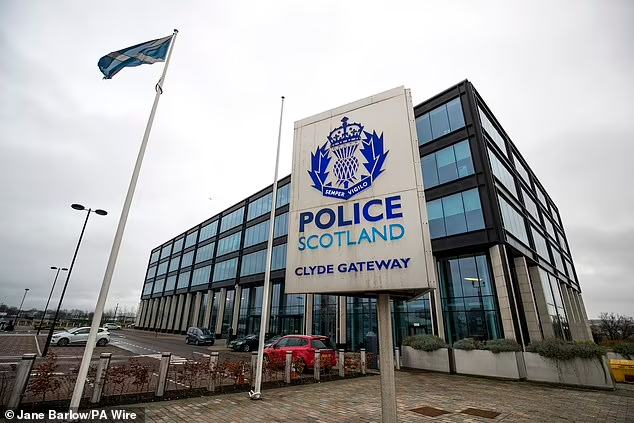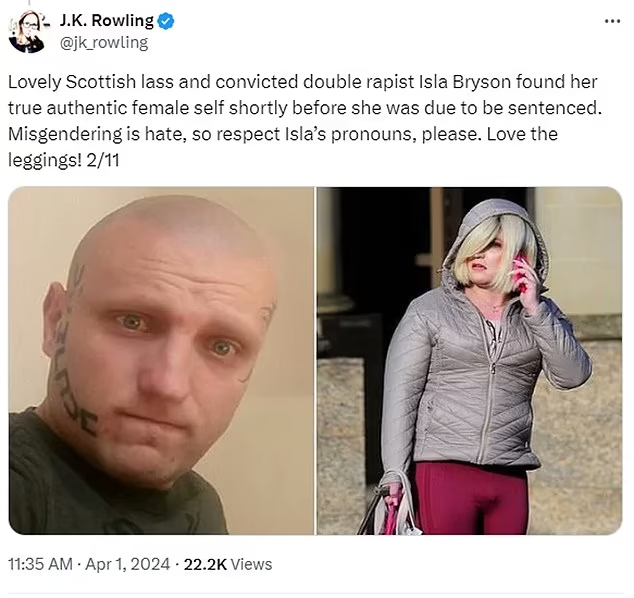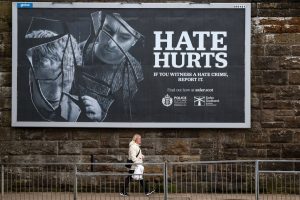
I had intended to follow up my last essay on the two proposed amendments to the Irish Constitution but ever reliable Scotland managed to gazump that project by doing something even more stupid that I just couldn’t ignore. I probably will do something on the amendments story but spoiler alert, the very short version is that Leo and Co. got hammered and humiliated and he resigned. (Constitutional Amendments ) So what did the Scots do that elbowed Leo and Co from the front page? Well the clue is in the title of this essay. They finally enacted the Hate Crime and Public Order (Scotland) Act 2021. You note that it was passed by the Scottish Parliament in 2021 but only enacted in April 2024. This was due to widespread opposition to it, not least of which came from the Scottish Police who were charged with, well, policing it. The delay is even more remarkable when you realise that most of it’s most objectionable provisions were already built in to the Public Order Act of 1986 which it consolidates. I have already discussed the utter ineptitude of the Scottish National Party’s (SNP) leadership in an essay concerning the housing of sex offenders and violent criminals in women’s prisons. (Safe Spaces) Both Nicola Sturgeon and her successor, First Minister Humza Yousaf, have their fingerprints all over this latest measure, which should fill no one with confidence.

By the way, just a sample of the amount of thought put in to this legislation is that complainants can visit any of 400 ‘third party reporting centres’ to process their claims. Pictured opposite are the owners of one such office, who operate a sex shop but you could also make your claim at a mushroom farm and a caravan park. As the police have no opportunity to pre vet these complaints and as most are anonymous it isn’t difficult to see where this is going.
So what are the new provisions of the 2021 Act? In summary, they incorporate the basic structure of the 1986 anti racist Public Order Act but expand it in two ways. Firstly the protected class is expanded from race to include age, disability, religion, sexual orientation, and transgender identity. It also includes an enhanced ‘stirring up provision’ which was first introduced in the 1986 Act. As an aside, the term ‘stirring up’ is borrowed from the name commonly given to the collet for the twenty fifth Sunday after Trinity or, the day people made their Christmas puddings. More importantly, the first thing to note is that there is no welcome for women in the new protected classes.

Quite why women were omitted is not clear but the First Minister has promised a special Act, in the future, all to themselves. I would hazard a guess that the inclusion of transgenderism in the new act gave Yousaf a problem. If he included women as a separate category as well as transgenderism, then where does a man claiming to be a woman sit at the table of the new protected classes? If a woman is protected under the Act does that mean that terms like TERF and transphobe can be classed as hate speech against them? I could imagine that JKR could come up with a far spicier collection of hate speech used against her but if she were to take action under the Act, will the police be the ones to arbitrate on the question of, what is a woman?
Before going into the detail of how this is going to be administered I would like to say that I am concerned about the widespread number of people represented by the protected classes. I understand how this comes about, the authorities want to demonstrate how seriously they take crimes against minorities. The problem comes when nearly everyone is included, as in this case. If we add women to the listed group mentioned under the Act, I leave it to you to work out who has been left out.

As mentioned above, one of the main groups to oppose the Bill were the Police. There are three main areas of concern when looking at the involvement of the police in enforcing the Hate Speech provisions. The first is the contract between the public and the police on which all community policing relies. People understand the trade off between giving the Police powers, to maintain public safety, as long as they are exercising it in a fair and effective way. However, rank and file of the Scottish Police Federation are unhappy to be put in the front line of managing contentious social and political issues. such as this one.
General secretary [of the Scottish Police Federation] Calum Steele said: “Police officers are all too aware that there are individuals in society who believe that to feel insulted or offended is a police matter……The bill would move even further from policing and criminalising of deeds and acts to the potential policing of what people think or feel, as well as the criminalisation of what is said in private.” BBC Scotland, 28/07/24
The second issue is the practicality of the police administrating the Act. Whilst senior management promise that every complaint will be investigated The Association of Scottish Police Superintendents, told MSPs that there was “enough anger and hateful bile online to occupy every police officer in Scotland”. (The Times, 30/03/24) Indeed at a time when the Police have said that they don’t have the resources to investigate low level crime, the consumption of person hours to review anonymous hate speech complaints is not at all popular with the public (See comment below). Police Scotland announced that they received 7,152 complaints in the first week of operating the Act. Obviously, this high number reflects the novelty of opportunist malcontents making anonymous accusations against those who don’t share their world view. The Guardian, always with it’s finger on the news pulse, reported that Police spammed with complaints by neo-Nazis under new Scottish hate crime law. It’s those neo-Nazis again, what would the legacy press do without them? How the Guardian pierced the veil of anonymity, which the police said was used in nearly every case, and how they accounted for the complaints made against both JKR and Humza Yousaf is a mystery. However, the more important question is, do we really believe that Police Scotland thoroughly reviewed 7,152 reports in a week? If you believe a Police spokesman who said, “This significant demand continues to be managed within our contact centres and so far the impact on frontline policing, ….. has been minimal.” then it must be true. (Mail Online 11/04/24) However, if common sense and past history is a guide, then we should look to other sources such as a report issued by HM Inspectorate of Constabulary in Scotland (HMICS) who says that staffing levels for frontline policing is stretched and only extensive use of overtime covers the gap. This will become important when we look at the number of cases listed as a non-crime hate incident.
The third problem with how the Act will be administered, follows on from the first two. We have seen the reluctance of the rank and file police to get involved in highly charged social and political issues. We have also seen from front line police that they are unable to investigate certain crimes due to lack of resources. Chief Inspector of Constabulary Craig Naylor said: ‘Many of those frontline officers and staff we spoke to indicated they felt that current staffing levels in their areas left them feeling vulnerable and, at times, unsafe.‘ (Mail Online 11/04/24) In both cases the police management have taken the opposite view. As we have seen, the police spokesman, quoted above talked about there being minimal effect from the 7k+ Hate Speech complaints received in the first week. In summary, the senior management of Police Scotland see no problem with policing hate speech whilst those who have to interact with the public, the rank and file, fear the loss of public confidence as they drift further away from their traditional role of catching criminals. The public have a right to be uneasy  about assurances from senior bureaucrats that we can sleep safely while the experts are on the job. It was the Scottish Prison Service (SPS) advised by the Scottish Trans Alliance, who designed the gender identity and gender reassignment policy to be implemented in Scottish Prisons. As JKR pointed out in her tweet this enabled Adam Graham (opposite) to be remanded in a women’s prison before public opinion forced a reversal. (see my essay The Gender Recognition Reform Bill). In the nature of state adopted ideology, it is no surprise that this situation had occurred before, this time in neighbouring England in the case of Stephen Terence Wood.
about assurances from senior bureaucrats that we can sleep safely while the experts are on the job. It was the Scottish Prison Service (SPS) advised by the Scottish Trans Alliance, who designed the gender identity and gender reassignment policy to be implemented in Scottish Prisons. As JKR pointed out in her tweet this enabled Adam Graham (opposite) to be remanded in a women’s prison before public opinion forced a reversal. (see my essay The Gender Recognition Reform Bill). In the nature of state adopted ideology, it is no surprise that this situation had occurred before, this time in neighbouring England in the case of Stephen Terence Wood.

Mr Wood, like Mr Graham was convicted of double rape and also like Mr Graham then claimed that he was a woman. He adopted the name of Karen White (see my essay Am I one of the Last Feminist Standing?) For those who believe that the state is apolitical and only has the interests of the public at heart, they should study these cases and then decide whether any state authority can be trusted to perform their duties faithfully, without rigorous public scrutiny. . To summarise, in both cases transgender ideology was baked in to the system; policy decisions were hidden from public view and there was no real consequences for those who failed their charges. I will leave this point with the pathetic apology made by the English Minister of Justice for exposing women prisoners to the mercy of Mr Wood. The Ministry of Justice has apologised for moving her to the women’s prison, saying that her previous offending history had not been taken into account. (The Guardian 11/10/18)

The proponents of the Act had a rather strange, contradictory and convoluted response to the various criticisms levied at them. Angela Constance, the Justice Secretary, said the 240 hate crimes recorded in the first week proved why the act was needed. (Daily Record 10/04/24) Does she understand that her figure of 240 represents approx 3% of the complaints made? Does she also understand that this only means that the Police consider that there may be a case to answer in these 240 instances? In other words, unlike a crime of violence, they are not ‘hate crimes’ until they have been proved to be so in a Court of Law. Humza Yousaf, on the other hand, tried to show that, ‘there is nothing to see here guv’ by saying that free speechers and JKR had nothing to fear since 240 ‘hate crimes’ was such a small, insignificant number that it proved how effective the police had been in policing the ‘hate speech’ complaints. The description of Mr Yousaf as being someone who pulls the pin out of a grenade and then throws the pin away, comes to mind. Mr Yousaf further defended his bill in a radio interview, saying: “I’ve asked this question of many people who’ve opposed the act. Can they give me an example of behaviour that is threatening or abusive and intends to stir up hatred that they don’t think should be prosecuted? And no answer comes.” The Times 06/04/24 I think that this is something of a circular argument and goes to the heart of the matter. Ask any 10 people to give an example of behaviour that is threatening or abusive and intends to stir up hatred and you will get 10 different answers. Katie Neeves, for example, was disappointed that the Police refused to take up JKR.s challenge to the Act. Ms Neeves was mentioned in JKR’s series of tweets and felt that “JK Rowling is a bully and this act was designed to stop bullying” and because her name was mentioned alongside the likes of Adam Graham (See above) that this was, “….inciting hatred and it resulted in me receiving thousands of messages of hate.” (BBC News 02/04/24) Just for information, Ms Neeves is a trans woman who is the UK’s UN Woman’s delegate. We seem to have two opposing views on one series of tweets and it is no surprise that it is on the trans issue. Surely the Minister of Community Safety can give us a definitive ruling on what is a hate crime and what isn’t?
If the public appear bewildered, so do Scottish government ministers. Siobhian Brown, the minister for community safety, was unable to explain on BBC Radio Scotland whether “misgendering” a person counts as a criminal act. This, she said, would be for the police to determine. The Times 06/04/24
There is another aspect to this legislation that the Scottish public are only now becoming aware of and that is the strangely named non-crime hate incident. The Hate Crime and Public Order (Scotland) Act: factsheet published on 16/04/24, had very little to say about this feature of hate speech policing, other than to say that these incidents had been recorded since 2004 and were kept purely for statistical purposes. The first problem is to try to understand what this odd animal is. In simple terms it is a hate speech complaint that the police decline to prosecute. We need to step into the weeds a bit here and understand that we are not recording an event, like a violent death, for example. We are trying to determine the mindset of someone who has said or, written something, someone has taken offense to. So who decides that? The coroner records a violent death and determines it’s cause and it is recorded in the crime statistics as such. However, a hate speech crime can not be described as a crime until the mindset of the accused, has been proved by the police to be threatening or abusive to someone, or it has to cause them fear or alarm. Siobhian Brown, the minister for community safety, seems to be happy to leave this to the police but just before the activation of the Act the police were asked ,what was the criteria for recording a non-crime hate incident (NCHI)? The police referred to the current national guidelines, which read as follows:
“For recording purposes, the perception of the victim or any other person is the defining factor in determining whether an incident is a hate incident or in recognising the malice element of a crime.” …….”The perception of the victim should always be explored, however they do not have to justify or provide evidence of their belief and police officers or staff members should not directly challenge this perception.” The Herald 29/04/24
This means that I could, anonymously, complain about JKR’s tweets and even though the police avoided confronting her in court, because I say that I am offended, the complaint will be recorded as a non-crime hate incident. No proof required, no evidence, no investigation just anonymous me, saying that I am offended! What sort of crime statistic does the Scottish government think they have here? This is year one accountancy stuff. Under pressure, Alan Speirs, Deputy Chief Constable for Professionalism, Strategy and Engagement (what splendid titles they have) said that NCHI’s will be recorded, “where it is necessary and proportionate to do so” and where it, “meets a particular policing purpose.” (The Herald 29/04/24) I wonder if Mr Speirs understands what that means? Does it mean that the guidelines have been changed? If so, what are the new rules? We know that there are going to be new rules because of the Miller v College of Policing ruling in England and Wales. We have already discussed the highly subjective and prejudicial way these NHCI reports are recorded as hate crimes, it now seems that these reports may be available to third parties who have requested an enhanced check from Disclosure Scotland. Such checks would be made where someone is seeking employment with children, for example.
Disclosure Scotland confirmed that enhanced checks “may include reference to non-conviction matters” such as non-crime hate incidents while The Scotsman understands information within hate incidents would fall under other relevant information in enhanced checks handed over by Police Scotland. (The Scotsman 28/04/24)
Is it possible that somewhere close to Scotland had a similar system that had been tested in the Courts? As Police Scotland well knew before the implementation of the 2021 Act the Appeals Court in England and Wales, had handed down a ruling stating that the recording of a NCHI which was available to third parties, violated the complainants right to free speech. It also, referred to the ECHR concept of ‘chilling’ free speech where such a record may cause a person to be discouraged from engaging in debate due to fear of prosecution. Once again we have seen chaos and confusion whenever a question is raised concerning this Act. Siobhian Brown, the minister for community safety, refers the matter to the police who say that they will act “proportionally”, whatever that means. However, Siobhian would be less confident in the police were she to look across the border and see what happened to a 14year old, autistic boy who had a non crime hate incident, recorded against him in England. Can she guarantee that a similarly, politicised, under resourced and overstretched Police Scotland will not make the same mistake?
And we could go on. As you peel away each layer of this proverbial onion it reveals yet another problem with this legislation. And here is the problem. The Hate Speech Act and the failed Named Persons, Gender Recognition and Behaviour at football proposals were all the products of a small cabal of not very bright but loud progressive elites. They believe that all aspects of society can be policed by a benevolent state. These are the people that Calum Steele (above) talked about when he said, “Police officers are all too aware that there are individuals in society who believe that to feel insulted or offended is a police matter.” These are the people of Davos or, Brussels who preach racism, agism, disability-ism, religion-ism, sexual orientation-ism, and transgender identity-ism. These are the people who have the levers of power. who inflict DEI and ESG on everyone else. These are the Leo Varadkars of this world, who amidst a housing, immigration and public services crisis chose to tinker with the Constitution with Amendments that no one wanted. These include the likes of John Kerry and his associates who clog up the Airport at Davos with their private jets and claim that they are ‘too important’ to travel coach, with the rest of us. We can add Dr Fauci, who during covid, ignored all other opinions claiming that he ‘represented science’. Closer to home we have the appalling arrogance and technical incompetence of the expert class at the British Post Office as can be seen on the ITV program, The Post Office v Mr Bates. Finally, we come to the terrible trio of SNP leaders, Alex Salmond, Nicola Sturgeon and Humza Yousaf who aptly demonstrate the failure of corrupt progressive policies. From unrealistic Green party climate programs to unpopular DEI (Divisiveness, Exclusion and Indoctrination: quote Marty Kotis) government social engineering projects. In the end this Act will fail because those that dreamed it up had no concept on how the real world works. They are constantly surprised by the reaction of the ‘deplorables’ to their ill thought out and authoritarian policies of which the Hate Crime and Public Order (Scotland) Act 2021 is a perfect example.
Comments
John Paterson
14th March 1:24 pm
“Recent statistics show that 5,738 charges of hate crime were reported in Scotland in 2022-23.” “Minister for Victims & Community Safety Siobhian Brown said: For those impacted by hatred and prejudice, the results can be traumatic and life changing.” There were 103,393 crimes of dishonesty (including theft, shoplifting, housebreaking and fraud) in Scotland in the same period.
A lot of these will now no longer be investigated.
Is it not traumatic and life changing for some of those who impacted by these crimes? The Herald 01/04/24
Sources
Alex Massie and Sian Bradley, 06/04/24, The Times, How Scotland made a mess of its hate crime law — in a week of chaos
Chris McCall, 10/04/24, Daily Record, Police Scotland swamped with more than 7,000 complaints in first week of new hate crime laws
Xander Elliards, 10/04/24, The National, Police Scotland publish Hate Crime Act data,
Jody Harrison, 01/04/24, The Herald. Explained: What are Scotland’s new Hate Crime Laws?
Leo Sands, 10/04/24, Washington Post, Scotland’s hate speech law ignites culture war far outside its border
28/07/24, BBC Scotland, New Scottish hate crime laws ‘could devastate legitimacy of police’
Mike Wade, 30/03/24, The Times, ‘You can’t police the world’: barrister takes on ‘insane’ hate crime law
Jon Brady, 11/04/24, Mail Online, Is that it? Just four per cent of hate complaints in Scotland made under Humza Yousaf’s controversial new law the week it came into force are being treated as crimes – with only EIGHT cases related to trans issues
Andrew Learmonth, 29/04/24, The Herald, Hate Crime: Questions over Police Scotland’s recording of hate crimes
David Bol, 28/03/24, The Scotsman, Fears recording non-crime ‘hate incidents’ could hamper job prospects under disclosure checks
Miller v College of Policing: Social media, ‘non-crime hate incidents’, and the right to freedom of expression. https://www.mountfordchambers.com/miller-v-college-of-policing-social-media-non-crime-hate-incidents-and-the-right-to-freedom-of-expression/
